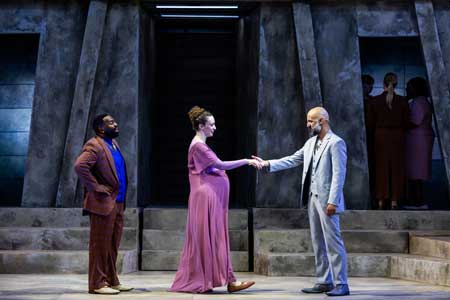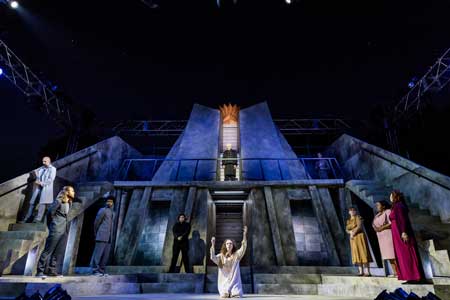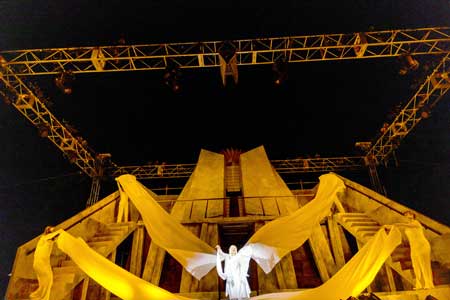Play (1623)
by William Shakespeare
Directed by Bryn Boice
Commonwealth Shakespeare Company
Boston Common
July 16 – August 4, 2024
Scenic Designer: James J. Fenton; Costume and Wig Desinger: Rachel Padula-Shufelt; Lighting Designer: Maximo Grano De Oro; Sound Designer: David Remedios; Original Music:Mackenzie Adamick; Choreographer: Victoria Lynn Awkward
With Nael Nacer (Leontes), Marianna Bassham (Hermione), Omar Robinson (Polixenes), Paula Plum (Paulina/Time), Tony Estrella (Camillo), Richard Snee (The Shepherd), Robert Walsh (Antigonus), Ryan Winkles (Autolycus), Joshua Olumide (Florizel), Nettie Chickering (Emilia), Clara Hevia (Perdita), Cleveland Nicoll (Clown), John Blair (First Lord), Bella Grace Harris (Gaoler/Bohemian Servant), Ednilson Tavares (Second Lord), Ryan Richard Doyle (Cleomenes/Ensemble), Hampton Richards (Dion/Ensemble), Rilyn Gardner (First Lady/Mopsa), Chloe Boyan (Second Lady/Dorcas), Anne Borzner (Doctor/First Gentleman), Eviva Rose (Mamillius)

Marianna Bassham as Hermione
Nael Nacer as Leontes
in “The Winter’s Tale”
Photo: Nile Scott Studios
Courtesy of Commonwealth Shakespeare Company
Leontes (Nael Nacer), King of Sicilia, is having a visit with his dear friend Polixenes (Omar Robinson), King of Bohemia, and things seem to be going swimmingly until Leontes gets a gander at Polixenes and Leontes’ pregnant wife, Hermione (Marianna Bassham), talking amiably with one another. Leontes reads into their friendly banter a deep and corrosive suspicion of something more, and things go from suspicion to weirdness in very short order. Leontes asks Camillo (Tony Estrella) his close aide, to kill Polixenes, but Camillo sees the crazy writing on the wall and warns Polixenes about the ill intentions and they both scramble back to Bohemia. Leontes intends to throw Hermione in jail, but, in the midst of all, the young son of Hermione and Leontes, Mamillius, dies, apparently of grief and anxiety, and somehow Paulina (Paula Plum) intercedes and indicates that Hermione has died as well. Meanwhile, Hermione has given birth to a daughter, which Leontes, in his vivid and horrible rage, seeks to exile, and asks the aged Antigonus (Bob Walsh) to deposit her on some foreign shore. Antigonus takes her to Bohemia where he delivers her to a shepherd (Richard Snee) who takes the baby in.
Sixteen years pass and Leontes is a changed man. The baby girl has grown and now, as the seemingly peasant-born Perdita (Clara Hevia), has fallen in love with Florizel (Joshua Olumide) who appears to her as a peasant but, in reality, is the son of Polixenes. When Polixenes gets wind of this romance, he’s none too pleased, but the star-crossed lovers are duty-bound to one another and to avoid Polixenes’ wrath beat it back to Sicilia. There, of course, in true Shakespearean comedic fashion, they come into contact with the much changed Leontes, and all sorts of wonderful and amazing things occur.
What a fabulous production this is! Not only is the cast first-rate and the performances stellar, but the staging is inventive, colorful, entertaining, and totally engrossing. Original music by Mackenzie Adamick is wonderful – noticeably interesting at all points and replete with a combination of spark and gravitas, so appropriate to the combined energies of the narrative. Though that combination of tragedy and comedy has made some call this a problem play, this production, so eloquently delivered, gives a sense in which that melding of dramatic and comedic tones makes very good sense.
The more difficult part to understand – and this is built in to the narrative itself – is how Leontes changes so much over the sixteen years that are thrust between the first and second parts. Though the masterful Nael Nacer, as Leontes, gives as much sense as possible about the earnestness of the change, we get virtually no sense of what brings it about. But, this is Shakespeare, after all, and he can do what he wants, even though it might raise some plausible questions in the audience.
The result is a kind of Othello without ultimate tragedy, a might-have-been tragedy with a quasi-comedic though poignant outcome, and it’s an interesting departure from the more traditional Shakespearean separation between heavy and light fare. But this exploration of the merger of those two motifs indicates a highly interesting development in Shakespeare’s later writing. We get a sense of that as well in the very late The Tempest, though without as much sense of the corrosive effects of jealousy, which is why that play is also generally dubbed something other than a comedy. But, if truth be told, many of Shakespeare’s comedies, even the early ones, have a profundity which goes beyond mere hilarity.
One might well argue that the degree of hilarity in The Winter’s Tale so expertly pulled off by Cleveland Nicoll as the Clown and Ryan Winkles as Autolycus, is unsuited to and inconsistent with the grave tone of the first acts in The Winter’s Tale. But somehow, in this production, it all seems to work. The clowning is indeed hilarious and over the top, but it is done so well that it does not seem a departure or distraction from the underlying drama. Though, in Hamlet, the gravediggers’ and the traveling players’ scenes are indeed very funny, they don’t draw away from the essential weight of the tragedy there. And the same feels true with this kind of hilarity in The Winter’s Tale where the tragedy is even less pronounced.

Josh Olumide as Florizel
with the Cast
in “The Winter’s Tale”
Photo: Nile Scott Studios
Courtesy of Commonwealth Shakespeare Company
In addition to the terrific music by Mackenzie Adamick and sound design by David Remedios, the lighting by Maximo Grano De Oro, the sets by James J. Fenton, and the staging in general of this production, are exquisite, strikingly entertaining and scintillating. In the second part, the rather dour but elegantly designed pyramidal structure comes alive with lights and streamers and everything takes on a colorful and party-like quality. It’s magical. If indeed the ball or sheepshearing scene is elongated – and it is very long in the written play, extending to almost an hour – this liveliness of presentation goes a long way to keeping it entertaining.
Th acting is universally good here, a testament to director Bryn Boice’s oversight, and the cast has so many Boston-area thespian luminaries, that the whole production shines.
In the title role of Leontes, Nael Nacer brings a quiet ferocity and a complementary tenderness that speak volumes for the uncharted territory between the character’s two extremes. Nacer is the kind of actor who can brood and seethe with the best of them, but turn around and make your heart break. One only has to think of his wide range of exceptional performances over the years to know that he brings that roster of emotions into this complex but moving part which leaves so much to the actor to figure out and fill in; Nacer rises admirably to the occasion.

and the Cast
in “The Winter’s Tale”
Photo: Nile Scott Studios
Courtesy of Commonwealth Shakespeare Company
As Hermione, the loving wife who is judged wrongly, the great Marianna Bassham, also a seasoned and expert veteran of many Boston productions, brings a combination of bold and trusting forthrightness and, in the aftermath, a stunned Stoicism, that does penetrating justice to the role of the moral anchor who never loses her grip. Bassham’s Hermione can be playfully trusting – as she is with Polixenes early on – and priestess-like, as she is in the final scenes. Like Nacer, she brings us through the entire spectrum, somehow conveying the transitions convincingly despite the huge gap of time and development left out of the narrative.

of “The Winter’s Tale”
Photo: Nile Scott Studios
Courtesy of Commonwealth Shakespeare Company
This production is blessed to have three true mentors of the area stage to bring home its senior roles. As Paulina, the great Paula Plum conveys a solidity and unremitting defiance of Leontes’ insanity, providing, with her deft conveyance of stalwart integrity and transcendent inspiration the foundation of support for Hermione. As Time, Plum has a wonderfully staged moment in which she literally wraps the entire stage in command of white streamers, a visually dramatic vehicle for the vast passage of changes that occur between the first and second parts of the play. As the shepherd who rescues the young child of Hermione and Leontes and rears her as Perdita, Richard Snee gives a sweetly elegant performance, tender and innocent, conveying the essence of a native generosity. And as Antigonus, wo conveys the babe to Bohemia, Bob Walsh also a luminary of the area stage, offers a kind and gentle wisdom that contributes to this triad of inspired guiding spirits.

and the Cast
in “The Winter’s Tale”
Photo: Nile Scott Studios
Courtesy of Commonwealth Shakespeare Company
Again, a tribute to the hilarity – and there is a considerable amount of it in this play – are the two wonderfully comedic presences, Cleveland Nicoll as Clown and Ryan Winkles as Autolycus. Both as exquisitely funny and together they make for a robust contribution to the unzipped and untamed side of this moral tale which, while conveying its message, gets a lot of very funny gybing in, and these two actors carry it with great abandon.
The cast is large and there are other great performances throughout, including well-known Boston-area actor Omar Robinson as Polixenes, who gives a warm and compelling vision of friendship early on, and later who has a convincing turn as the raging parent who cannot quite see that this son, falling in love with a shepherd’s daughter, has actually found a princess. As Robinson’s implicit sense of gentle irony demonstrates, whether she is a princess or not matters far less than that his son has found a loving partner.
Overall: this is a beautifully conceived, directed, acted and designed show, and its freeeeeee! Definitely try to get out to the Boston Common and see it.
– BADMan (aka Charles Munitz)
Leave a Reply